9年级人教版全一册 Unit 10 You're supposed to shake hands. Section B (2a—2e)习题课件(共38张PPT)
文档属性
| 名称 | 9年级人教版全一册 Unit 10 You're supposed to shake hands. Section B (2a—2e)习题课件(共38张PPT) |
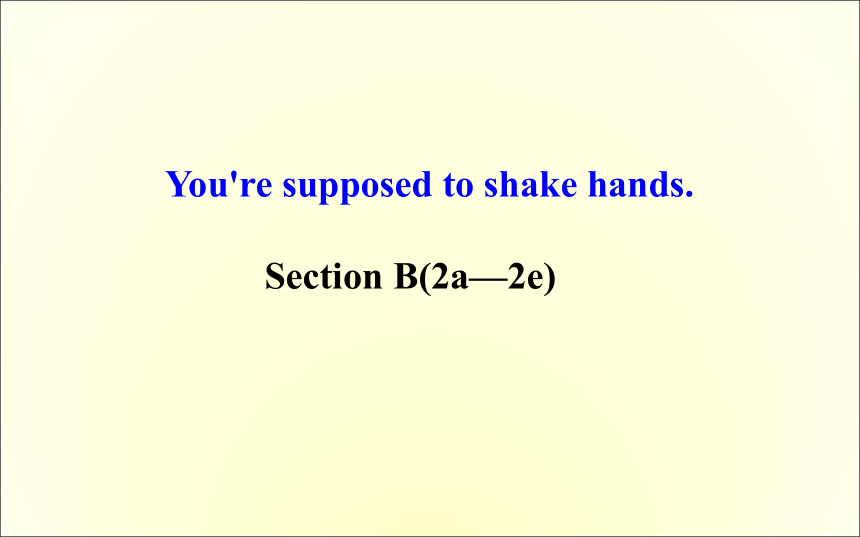
|
|
| 格式 | zip | ||
| 文件大小 | 1.5MB | ||
| 资源类型 | 教案 | ||
| 版本资源 | 人教新目标(Go for it)版 | ||
| 科目 | 英语 | ||
| 更新时间 | 2023-02-03 00:00:00 | ||
图片预览

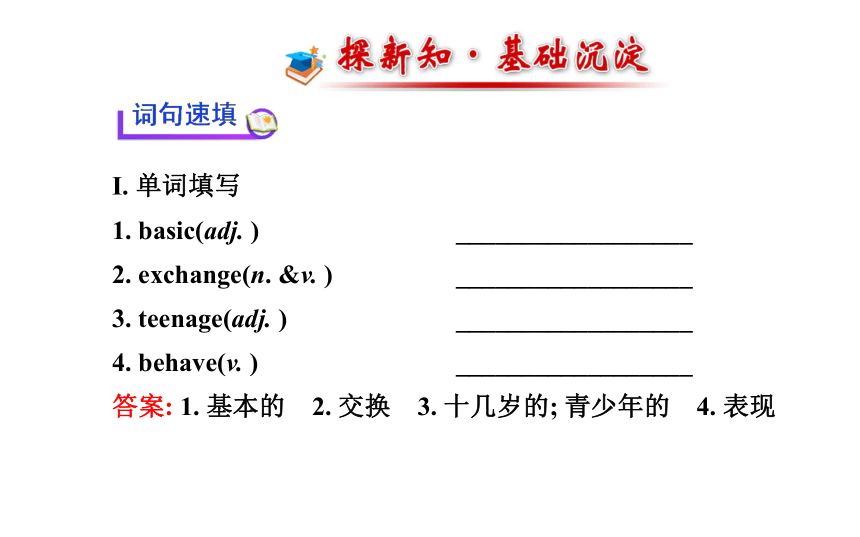
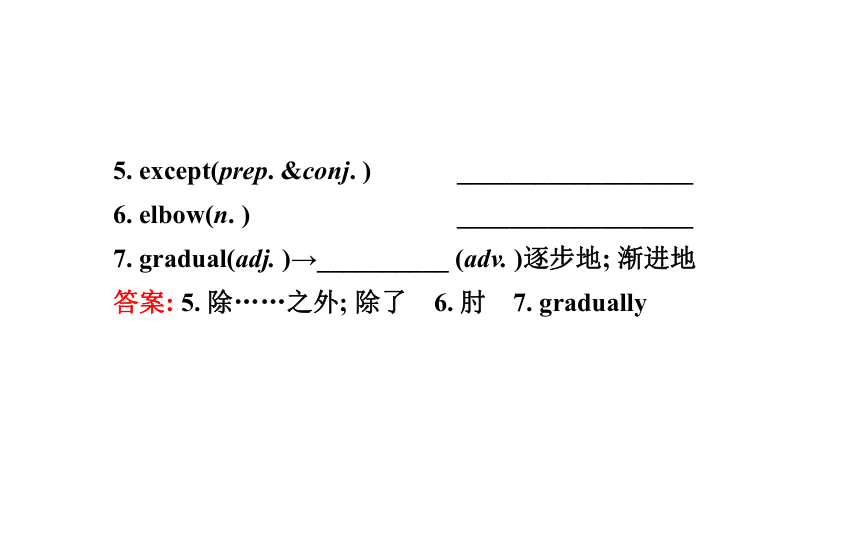
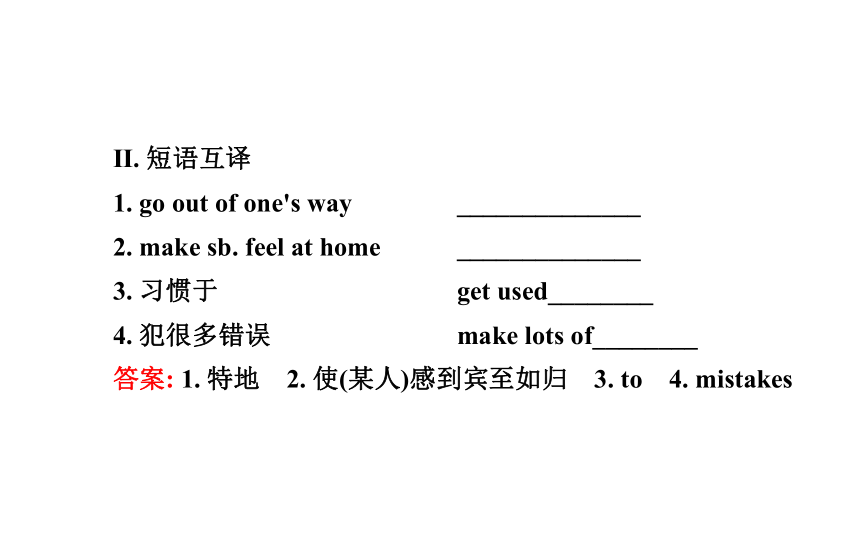
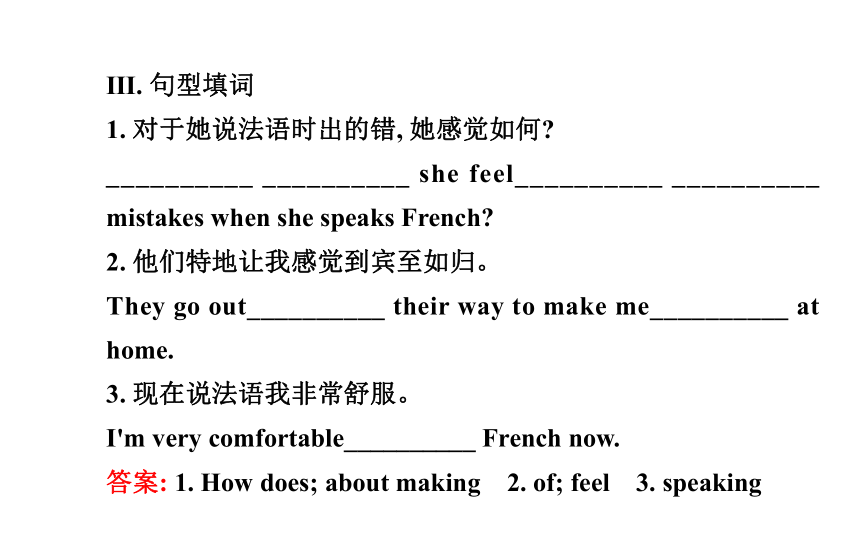
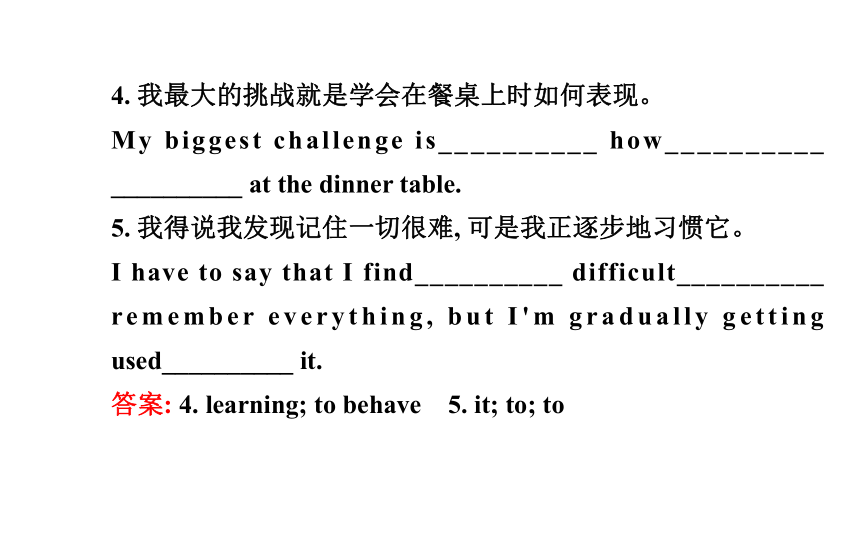
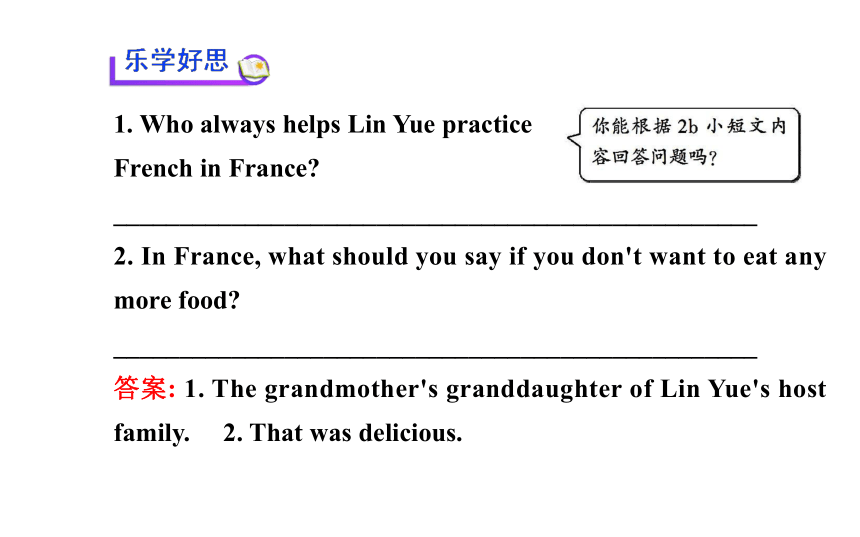
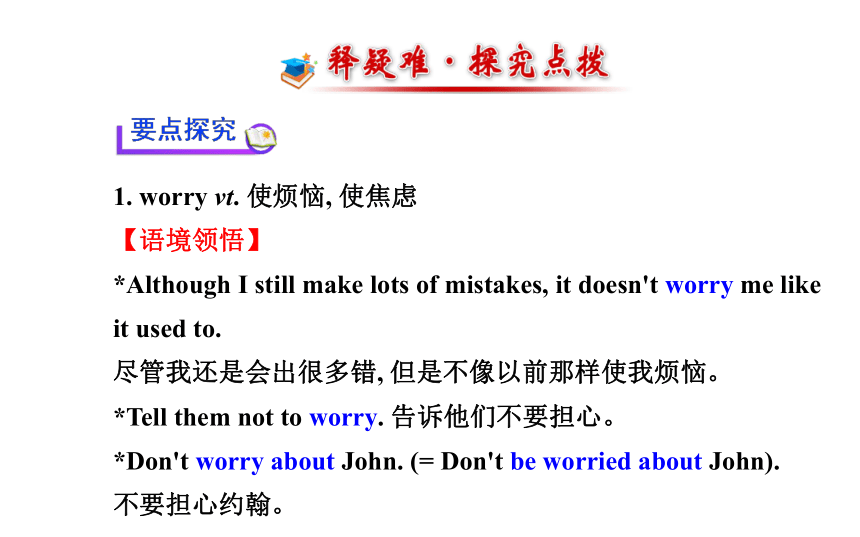
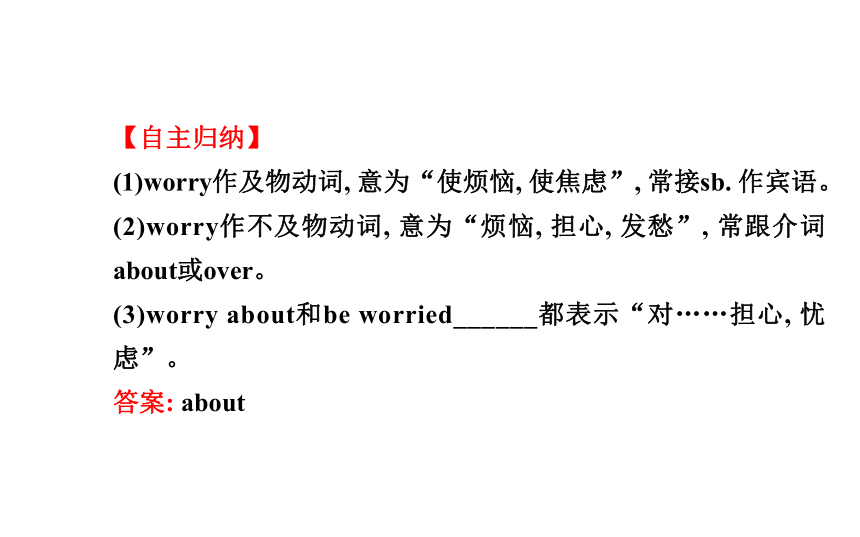
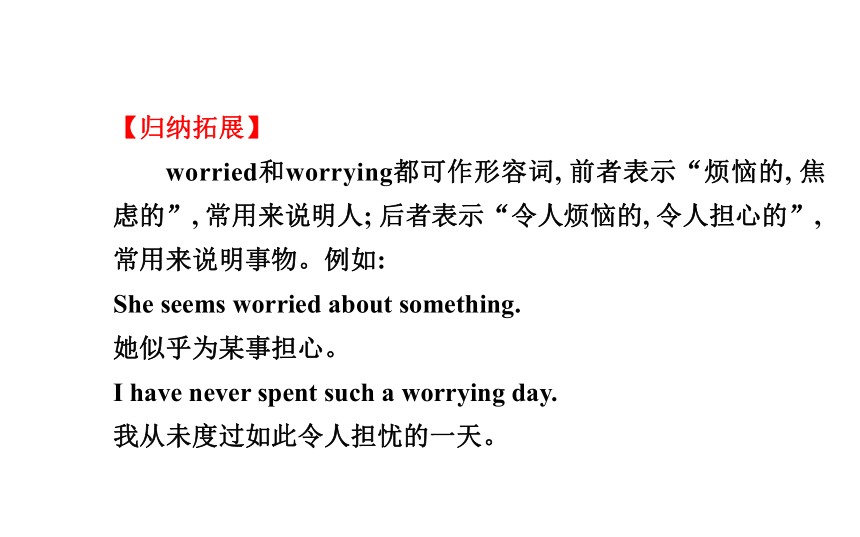

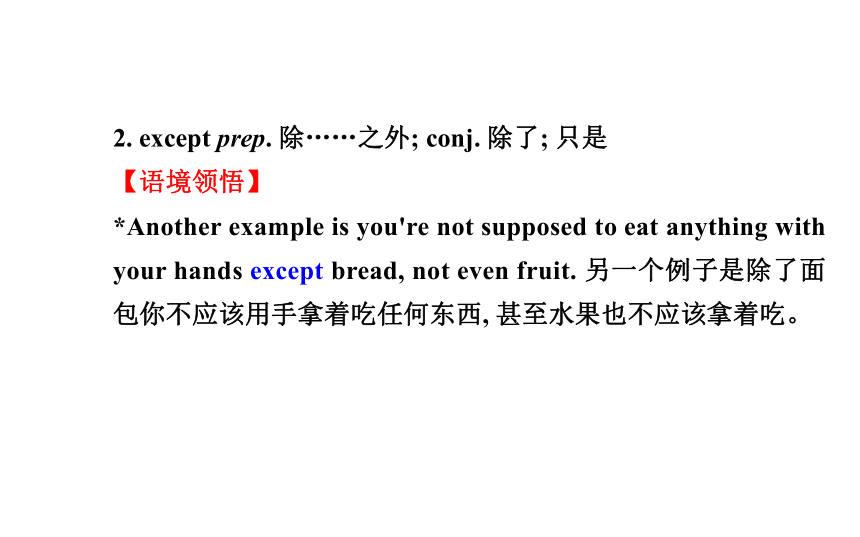
文档简介
(共38张PPT)
You're supposed to shake hands.
Section B(2a—2e)
Ⅰ. 单词填写
1. basic(adj. ) __________________
2. exchange(n. &v. ) __________________
3. teenage(adj. ) __________________
4. behave(v. ) __________________
答案: 1. 基本的 2. 交换 3. 十几岁的; 青少年的 4. 表现
5. except(prep. &conj. ) __________________
6. elbow(n. ) __________________
7. gradual(adj. )→__________ (adv. )逐步地; 渐进地
答案: 5. 除……之外; 除了 6. 肘 7. gradually
Ⅱ. 短语互译
1. go out of one's way ______________
2. make sb. feel at home ______________
3. 习惯于 get used________
4. 犯很多错误 make lots of________
答案: 1. 特地 2. 使(某人)感到宾至如归 3. to 4. mistakes
Ⅲ. 句型填词
1. 对于她说法语时出的错, 她感觉如何
__________ __________ she feel__________ __________ mistakes when she speaks French
2. 他们特地让我感觉到宾至如归。
They go out__________ their way to make me__________ at home.
3. 现在说法语我非常舒服。
I'm very comfortable__________ French now.
答案: 1. How does; about making 2. of; feel 3. speaking
4. 我最大的挑战就是学会在餐桌上时如何表现。
My biggest challenge is__________ how__________ __________ at the dinner table.
5. 我得说我发现记住一切很难, 可是我正逐步地习惯它。
I have to say that I find__________ difficult__________ remember everything, but I'm gradually getting used__________ it.
答案: 4. learning; to behave 5. it; to; to
1. Who always helps Lin Yue practice
French in France
_________________________________________________
2. In France, what should you say if you don't want to eat any more food
_________________________________________________
答案: 1. The grandmother's granddaughter of Lin Yue's host family. 2. That was delicious.
1. worry vt. 使烦恼, 使焦虑
【语境领悟】
*Although I still make lots of mistakes, it doesn't worry me like it used to.
尽管我还是会出很多错, 但是不像以前那样使我烦恼。
*Tell them not to worry. 告诉他们不要担心。
*Don't worry about John. (= Don't be worried about John).
不要担心约翰。
【自主归纳】
(1)worry作及物动词, 意为“使烦恼, 使焦虑”, 常接sb. 作宾语。
(2)worry作不及物动词, 意为“烦恼, 担心, 发愁”, 常跟介词about或over。
(3)worry about和be worried______都表示“对……担心, 忧虑”。
答案: about
【归纳拓展】
worried和worrying都可作形容词, 前者表示“烦恼的, 焦虑的”, 常用来说明人; 后者表示“令人烦恼的, 令人担心的”, 常用来说明事物。例如:
She seems worried about something.
她似乎为某事担心。
I have never spent such a worrying day.
我从未度过如此令人担忧的一天。
【学以致用】
(2013·白银中考)—Oh! We've just missed the 8 o'clock film.
—______. It'll be on again in one hour.
A. My pleasure B. Have fun
C. Don't worry D. Good idea
2. except prep. 除……之外; conj. 除了; 只是
【语境领悟】
*Another example is you're not supposed to eat anything with your hands except bread, not even fruit. 另一个例子是除了面包你不应该用手拿着吃任何东西, 甚至水果也不应该拿着吃。
*There is nothing but a card in the box.
盒子里除了一张卡片之外什么也没有。
*I like many other sports besides swimming.
除了游泳, 我还喜欢许多其他运动。
*I am feeling well except for having a cold sometimes.
除了偶尔感冒, 我身体一直很好。
【自主归纳】
except作介词, 意为“除……之外”。
They were all there except me. 除了我以外, 他们都在那里。
【妙辨异同】except/besides/but/except for的辨析
(1)except意为“除……之外”, 不包括后面的内容。
(2)besides意为“除……之外, 还有……”, 包括besides后的内容。
(3)but与except同义, 如果句中有no one, nobody, nothing, all, everyone, everything等词, 多用but。
(4)except for意为“除……之外”, 说明整体情况后, 从细节上加以修正。
【学以致用】
(2013·黔西南州中考)All of you went to the zoo ______Wang Hai. He had to look after his grandma.
A. besides B. with
C. except D. beside
【授课备选】补充练习
(2013·菏泽中考)Most of the kids in our school enjoy pop songs, ______some hit songs on the Internet likeGangnam Style.
A. besides B. including
C. except D. without
【解析】选B。考查介词。句意: 我们学校的大多数孩子都喜欢流行歌曲, 包括网络上像《江南Style》这样流行的一些歌曲。besides“除……之外(还)”, except“除……之外”(从整体中除去个别), without“没有”。以上三个介词都不符合句意。
3. get used to习惯于
【语境领悟】
*. . . but I'm gradually getting used to it.
……可是我正渐渐地习惯它。
*My grandma wasn't used to the city life, but now she has got used to living in the city.
我祖母过去不习惯城市生活, 但现在已习惯生活在城里了。
*My father used to ride his bike to work, but now he drives to work. 我爸爸过去常骑自行车去上班, 但现在他开车去上班。
【自主归纳】
get used to意为“习惯于……”, 后接名词、代词或动词-ing形式。
He is getting used to living in the south.
他正在习惯南方的生活。
【归纳拓展】 与used相关的其他短语的用法
be used to sth. / ______sth. 意为“习惯于……”, 相当于短语get used to
be used to______sth. 意为“被用来做某事”, 是动词use的被动结构
used to do sth. 意为“过去常做某事”, 表达过去
答案: doing; do
【学以致用】
(2013·随州中考)—How does Jack usually go to work
—He______drive a car, but now he______there to lose weight.
A. used to; is used to walk
B. was used to; is used to walking
C. was used to; is used to walk
D. used to; is used to walking
4. I have to say that I find it difficult to remember everything, but I'm gradually getting used to it.
我得说我发现记住一切很难, 可是我正渐渐地习惯它。
【句型剖析】
此句中含有一个“find it +adj. + to do sth. ”的句型, ______为形式宾语, 真正的宾语为后面的动词不定式。除find外, feel, think, make等词也有此用法。
答案: it
【归纳拓展】
(1)find sb. doing sth. 发现某人正在做某事。类似用法如hear/see sb. doing sth. 表示“听见/看见某人正在做某事”。
I found him standing at the door.
我发现他正站在门口。
(2)find+ sth. +adj. 发现某物怎么样。
He found the room empty.
他发现房间是空的。
【学以致用】
(2013·淮安中考)At times, parents find it difficult______with their teenage children.
A. talk B. talked C. talking D. to talk
【备选要点】
1. make+宾语+adj.
【语境领悟】
*Making mistakes in French used to make Lin Yue nervous.
在法语方面出错过去常使林月紧张。
*This term we make Jim monitor.
这个学期我们让吉姆当班长。
*He made me wait for him for a long time. 他让我等了好久。
*They want to make it clear to the public that they do an important and necessary job. 他们要向公众表明, 他们所做的工作不但重要, 而且是必不可少的。
【自主归纳】 make的四种结构
(1)make+宾语+形容词 意为“使某人/某事(变得)……”, 形容词通常用表示感情的happy, sad, angry或表示状态的rich, strong等;
(2)make+宾语+名词 意为“使/让某人或某物(成为)……”;
(3)make+宾语+不带to的不定式 意为“使某人/某物做某事”;
(4)make+it+形容词+不定式(或从句) 意为“使得做某事变得……”, 形容词常用表示事物性质的easy, difficult, interesting等。
【归纳拓展】
在英语中, 后跟省略to的动词不定式作宾语补足语的动词(短语)还有: feel; hear, listen to; let, have, make; see, watch, notice, observe等。可以总结为一句话“一感二听三让四看”。
【学以致用】
(2013·重庆中考)He lost his key. It made him______in the cold to wait for his wife's return.
A. to stay B. stayed C. stays D. stay
2. As you can imagine, things are very different from the way they are at home.
正如你所能想象到的, 情况与国内的方式大不一样。
【句型剖析】
as作为连词, 常引导从句:
含 义 用 法 例 句
当……时候 引导时间状语从句 As he grew up, he became silent.
他长大以后, 变得沉默寡言。
既然, 因为 引导原因状语从句 As you are seriously ill, you can't go to school today.
既然你病得很重, 今天可以不去上学了。
如, 像 引导方式状语从句 You must do as the teacher tells you.
你必须按照老师告诉你的那样去做。
一……就…… (as soon as) 引导时间状语从句 I'll tell him the good news as soon as he comes back.
他一回来, 我就告诉他这个好消息。
【归纳拓展】
as作为副词, 常与连词as连用, as…as…意为“和……一样……”, 中间用形容词或副词的原级。例如: My shoes are as beautiful as hers. 我的鞋和她的鞋一样漂亮。
【学以致用】
这男孩边骑车边唱一首流行歌。
The boy was singing a popular song__________ he was bicycling.
答案: as
Ⅰ. 选词并用其适当形式填空
knife, table, full, bread, teenage
1. It's important to learn basic__________ manners.
2. In a western restaurant, you have to eat with a fork, a__________ and a spoon.
3. —Would you like another hamburger
—No, thanks. I'm__________ .
答案: 1. table 2. knife 3. full
4. My host family has a__________ daughter.
5. In France, you are supposed to put your__________ on the table.
答案: 4. teenage 5. bread
Ⅱ. 完成句子
1. 我发现在网上聊天很有趣。
I find__________ interesting__________ __________ online.
2. 上周末, 除了琳达我们都去爬山了。
We all went climbing the hills__________ Linda last weekend.
3. 听音乐能使我们放松。
Listening to music can__________ us__________ relaxed.
答案: 1. it; to chat 2. except 3. make; feel
4. 我最大的问题就是学会如何赚钱。
My biggest problem is__________ __________ to make money.
5. 露西过去常去超市购物, 但现在她习惯于网购。
Lucy__________ __________ go shopping in a supermarket, but now she__________ __________ __________ buying things online.
答案: 4. learning how 5. used to; is/gets used to
You're supposed to shake hands.
Section B(2a—2e)
Ⅰ. 单词填写
1. basic(adj. ) __________________
2. exchange(n. &v. ) __________________
3. teenage(adj. ) __________________
4. behave(v. ) __________________
答案: 1. 基本的 2. 交换 3. 十几岁的; 青少年的 4. 表现
5. except(prep. &conj. ) __________________
6. elbow(n. ) __________________
7. gradual(adj. )→__________ (adv. )逐步地; 渐进地
答案: 5. 除……之外; 除了 6. 肘 7. gradually
Ⅱ. 短语互译
1. go out of one's way ______________
2. make sb. feel at home ______________
3. 习惯于 get used________
4. 犯很多错误 make lots of________
答案: 1. 特地 2. 使(某人)感到宾至如归 3. to 4. mistakes
Ⅲ. 句型填词
1. 对于她说法语时出的错, 她感觉如何
__________ __________ she feel__________ __________ mistakes when she speaks French
2. 他们特地让我感觉到宾至如归。
They go out__________ their way to make me__________ at home.
3. 现在说法语我非常舒服。
I'm very comfortable__________ French now.
答案: 1. How does; about making 2. of; feel 3. speaking
4. 我最大的挑战就是学会在餐桌上时如何表现。
My biggest challenge is__________ how__________ __________ at the dinner table.
5. 我得说我发现记住一切很难, 可是我正逐步地习惯它。
I have to say that I find__________ difficult__________ remember everything, but I'm gradually getting used__________ it.
答案: 4. learning; to behave 5. it; to; to
1. Who always helps Lin Yue practice
French in France
_________________________________________________
2. In France, what should you say if you don't want to eat any more food
_________________________________________________
答案: 1. The grandmother's granddaughter of Lin Yue's host family. 2. That was delicious.
1. worry vt. 使烦恼, 使焦虑
【语境领悟】
*Although I still make lots of mistakes, it doesn't worry me like it used to.
尽管我还是会出很多错, 但是不像以前那样使我烦恼。
*Tell them not to worry. 告诉他们不要担心。
*Don't worry about John. (= Don't be worried about John).
不要担心约翰。
【自主归纳】
(1)worry作及物动词, 意为“使烦恼, 使焦虑”, 常接sb. 作宾语。
(2)worry作不及物动词, 意为“烦恼, 担心, 发愁”, 常跟介词about或over。
(3)worry about和be worried______都表示“对……担心, 忧虑”。
答案: about
【归纳拓展】
worried和worrying都可作形容词, 前者表示“烦恼的, 焦虑的”, 常用来说明人; 后者表示“令人烦恼的, 令人担心的”, 常用来说明事物。例如:
She seems worried about something.
她似乎为某事担心。
I have never spent such a worrying day.
我从未度过如此令人担忧的一天。
【学以致用】
(2013·白银中考)—Oh! We've just missed the 8 o'clock film.
—______. It'll be on again in one hour.
A. My pleasure B. Have fun
C. Don't worry D. Good idea
2. except prep. 除……之外; conj. 除了; 只是
【语境领悟】
*Another example is you're not supposed to eat anything with your hands except bread, not even fruit. 另一个例子是除了面包你不应该用手拿着吃任何东西, 甚至水果也不应该拿着吃。
*There is nothing but a card in the box.
盒子里除了一张卡片之外什么也没有。
*I like many other sports besides swimming.
除了游泳, 我还喜欢许多其他运动。
*I am feeling well except for having a cold sometimes.
除了偶尔感冒, 我身体一直很好。
【自主归纳】
except作介词, 意为“除……之外”。
They were all there except me. 除了我以外, 他们都在那里。
【妙辨异同】except/besides/but/except for的辨析
(1)except意为“除……之外”, 不包括后面的内容。
(2)besides意为“除……之外, 还有……”, 包括besides后的内容。
(3)but与except同义, 如果句中有no one, nobody, nothing, all, everyone, everything等词, 多用but。
(4)except for意为“除……之外”, 说明整体情况后, 从细节上加以修正。
【学以致用】
(2013·黔西南州中考)All of you went to the zoo ______Wang Hai. He had to look after his grandma.
A. besides B. with
C. except D. beside
【授课备选】补充练习
(2013·菏泽中考)Most of the kids in our school enjoy pop songs, ______some hit songs on the Internet likeGangnam Style.
A. besides B. including
C. except D. without
【解析】选B。考查介词。句意: 我们学校的大多数孩子都喜欢流行歌曲, 包括网络上像《江南Style》这样流行的一些歌曲。besides“除……之外(还)”, except“除……之外”(从整体中除去个别), without“没有”。以上三个介词都不符合句意。
3. get used to习惯于
【语境领悟】
*. . . but I'm gradually getting used to it.
……可是我正渐渐地习惯它。
*My grandma wasn't used to the city life, but now she has got used to living in the city.
我祖母过去不习惯城市生活, 但现在已习惯生活在城里了。
*My father used to ride his bike to work, but now he drives to work. 我爸爸过去常骑自行车去上班, 但现在他开车去上班。
【自主归纳】
get used to意为“习惯于……”, 后接名词、代词或动词-ing形式。
He is getting used to living in the south.
他正在习惯南方的生活。
【归纳拓展】 与used相关的其他短语的用法
be used to sth. / ______sth. 意为“习惯于……”, 相当于短语get used to
be used to______sth. 意为“被用来做某事”, 是动词use的被动结构
used to do sth. 意为“过去常做某事”, 表达过去
答案: doing; do
【学以致用】
(2013·随州中考)—How does Jack usually go to work
—He______drive a car, but now he______there to lose weight.
A. used to; is used to walk
B. was used to; is used to walking
C. was used to; is used to walk
D. used to; is used to walking
4. I have to say that I find it difficult to remember everything, but I'm gradually getting used to it.
我得说我发现记住一切很难, 可是我正渐渐地习惯它。
【句型剖析】
此句中含有一个“find it +adj. + to do sth. ”的句型, ______为形式宾语, 真正的宾语为后面的动词不定式。除find外, feel, think, make等词也有此用法。
答案: it
【归纳拓展】
(1)find sb. doing sth. 发现某人正在做某事。类似用法如hear/see sb. doing sth. 表示“听见/看见某人正在做某事”。
I found him standing at the door.
我发现他正站在门口。
(2)find+ sth. +adj. 发现某物怎么样。
He found the room empty.
他发现房间是空的。
【学以致用】
(2013·淮安中考)At times, parents find it difficult______with their teenage children.
A. talk B. talked C. talking D. to talk
【备选要点】
1. make+宾语+adj.
【语境领悟】
*Making mistakes in French used to make Lin Yue nervous.
在法语方面出错过去常使林月紧张。
*This term we make Jim monitor.
这个学期我们让吉姆当班长。
*He made me wait for him for a long time. 他让我等了好久。
*They want to make it clear to the public that they do an important and necessary job. 他们要向公众表明, 他们所做的工作不但重要, 而且是必不可少的。
【自主归纳】 make的四种结构
(1)make+宾语+形容词 意为“使某人/某事(变得)……”, 形容词通常用表示感情的happy, sad, angry或表示状态的rich, strong等;
(2)make+宾语+名词 意为“使/让某人或某物(成为)……”;
(3)make+宾语+不带to的不定式 意为“使某人/某物做某事”;
(4)make+it+形容词+不定式(或从句) 意为“使得做某事变得……”, 形容词常用表示事物性质的easy, difficult, interesting等。
【归纳拓展】
在英语中, 后跟省略to的动词不定式作宾语补足语的动词(短语)还有: feel; hear, listen to; let, have, make; see, watch, notice, observe等。可以总结为一句话“一感二听三让四看”。
【学以致用】
(2013·重庆中考)He lost his key. It made him______in the cold to wait for his wife's return.
A. to stay B. stayed C. stays D. stay
2. As you can imagine, things are very different from the way they are at home.
正如你所能想象到的, 情况与国内的方式大不一样。
【句型剖析】
as作为连词, 常引导从句:
含 义 用 法 例 句
当……时候 引导时间状语从句 As he grew up, he became silent.
他长大以后, 变得沉默寡言。
既然, 因为 引导原因状语从句 As you are seriously ill, you can't go to school today.
既然你病得很重, 今天可以不去上学了。
如, 像 引导方式状语从句 You must do as the teacher tells you.
你必须按照老师告诉你的那样去做。
一……就…… (as soon as) 引导时间状语从句 I'll tell him the good news as soon as he comes back.
他一回来, 我就告诉他这个好消息。
【归纳拓展】
as作为副词, 常与连词as连用, as…as…意为“和……一样……”, 中间用形容词或副词的原级。例如: My shoes are as beautiful as hers. 我的鞋和她的鞋一样漂亮。
【学以致用】
这男孩边骑车边唱一首流行歌。
The boy was singing a popular song__________ he was bicycling.
答案: as
Ⅰ. 选词并用其适当形式填空
knife, table, full, bread, teenage
1. It's important to learn basic__________ manners.
2. In a western restaurant, you have to eat with a fork, a__________ and a spoon.
3. —Would you like another hamburger
—No, thanks. I'm__________ .
答案: 1. table 2. knife 3. full
4. My host family has a__________ daughter.
5. In France, you are supposed to put your__________ on the table.
答案: 4. teenage 5. bread
Ⅱ. 完成句子
1. 我发现在网上聊天很有趣。
I find__________ interesting__________ __________ online.
2. 上周末, 除了琳达我们都去爬山了。
We all went climbing the hills__________ Linda last weekend.
3. 听音乐能使我们放松。
Listening to music can__________ us__________ relaxed.
答案: 1. it; to chat 2. except 3. make; feel
4. 我最大的问题就是学会如何赚钱。
My biggest problem is__________ __________ to make money.
5. 露西过去常去超市购物, 但现在她习惯于网购。
Lucy__________ __________ go shopping in a supermarket, but now she__________ __________ __________ buying things online.
答案: 4. learning how 5. used to; is/gets used to
同课章节目录
- Unit 1 How can we become good learners.
- Section A
- Section B
- Unit 2 I think that mooncakes are delicious!
- Section A
- Section B
- Unit 3 Could you please tell me where the restroom
- Section A
- Section B
- Unit 4 I used to be afraid of the dark.
- Section A
- Section B
- Unit 5 What are the shirts made of?
- Section A
- Section B
- Review of Units 1-5
- Unit 6 When was it invented?
- Section A
- Section B
- Unit 7 Teenagers should be allowed to choose their
- Section A
- Section B
- Unit 8 It must belong to Carla.
- Section A
- Section B
- Unit 9 I like music that I can dance to.
- Section A
- Section B
- Unit 10 You're supposed to shake hands.
- Section A
- Section B
- Review of Units 6-10
- Unit 11 Sad movies make me cry.
- Section A
- Section B
- Unit 12 Life is full of the unexpected
- Section A
- Section B
- Unit 13 We're trying to save the earth!
- Section A
- Section B
- Unit 14 I remember meeting all of you in Grade 7.
- Section A
- Section B
- Review of Units 11-14
